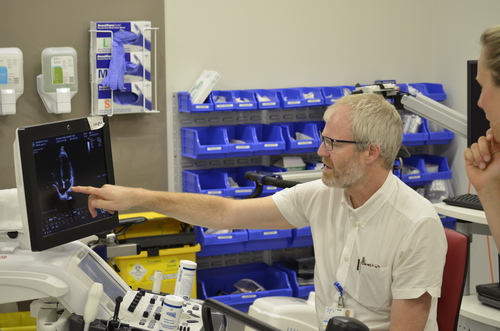Metabolic exercise stress test
A cardiopulmonary/metabolic exercise stress test lets your doctor see how your lungs, heart and muscles react to exercise. While you walk on a treadmill or ride a stationary bike, we will measure how much air you breathe, how much oxygen you need and how fast and efficiently your heart beats.
To measure the amount of air that you breathe, you will need to wear a mouthpiece and a soft nose clip. An ECG (electrocardiogram) will check the electrical activity of your heart, a blood pressure cuff will measure your blood pressure at the beginning and end of the test and a small peg on your finger will measure how much oxygen is in your blood.
Preparing for the test
Please wear comfortable, loose-fitting clothing and flat shoes that will not slip off.
Before the test you may take breathing medications, such as inhalers, and any other medications that you normally take.
- Smoking, eating and drinking
If you smoke, please avoid smoking for at least eight hours before the test. It is also important that you do not eat or drink coffee, tea or any other drinks containing caffeine for two hours before the test. This is to make sure that the measurements we take are as accurate as possible.
Please tell the doctor about any conditions (temporary or permanent) that could affect your ability to move, walk, stand, or keep your balance. If possible please try to discuss this when you are first told that you should have this test as it cannot be performed if you are unable to walk. It is also important that the cardiac physiologist / doctor carrying out the test has this information.
Please try to be as well rested as possible and do not do any heavy exercise earlier on the same day. You may need to reschedule the test if you feel unwell (for example, if you have a cold). If you do not feel you can give your best exercise effort, please contact the department before or on the day of the test.
How the test is carried out
Before the test begins the cardiac technologist or supervising doctor will explain it to you. Please ask as many questions as you need to and share any concerns at this time. You will be asked about any symptoms you have had while exercising in the past. Please try to describe as best as you can any chest discomfort, breathing problems, light-headedness, dizziness, fluttering in the chest, weakness, tiredness, or anything else you think may be relevant.
To monitor your heart during exercise your chest will be cleaned with alcohol and shaved in some areas (if necessary) before sticky patches called electrodes will be put on your chest. This does not hurt.
A cardiac technologist and doctor will be with you during the test.
Your heart rate and rhythm, blood pressure, breathing rate, the amount of oxygen you use and how much oxygen is in your blood (finger probe) will all be checked during the test.
To begin with a resting measurement, lasting three minutes, will be taken. During this time you will be standing. After this the treadmill's pace and incline (slope) will increase gradually (every three minutes). If the test is performed using a bike, the resistance to pedaling will be gradually increased.
As the mouthpiece will be in place you will be told to give hand instructions to reply to the cardiac physiologist's questions during the test. You should breathe as normally as possible through the mouthpiece during the test. It will feel a little bit strange at first, as though you have a cold, but it is not uncomfortable or painful.
Keep walking on the treadmill or pedaling the bike until you are told to stop or until you are either too short of breath or unable to carry on for some other reason. The cardiac technologist may stop the test if he/she has all the information that is needed.
During the recovery stage you should keep walking as the treadmill slows down. Please do not jump off the treadmill! While you rest your breathing, heart rate and oxygen level will continue to be monitored. All these instructions will be carefully explained to you on the day.
After the test
You can eat and drink as usual.
Depending on how you feel you may go about your normal routine or take it easy if you feel tired.
Please do not take a hot shower for at least an hour after the test. Your blood vessels expand with exercise and need time to return to normal. A hot shower may expand them more causing low blood pressure and dizziness.
If you have any questions about the test please feel free to ask. The cardiac physiologists, doctors and nurses are there to help you at all times.
Results
The results will be sent to the doctor who referred you for the test. He/she will normally discuss the results with you at your next appointment.
